German actress Brigitte Mira (1910-2005) worked in both theatre and film. During the 1970s, she was one of the stars of the films of Rainer Werner Fassbinder, and Mira won several awards. She became an embodiment of 'Berliner Schnauze' (the typical Berlin dialect) with her starring role in the long-running TV series Drei Damen vom Grill (1976-1991).
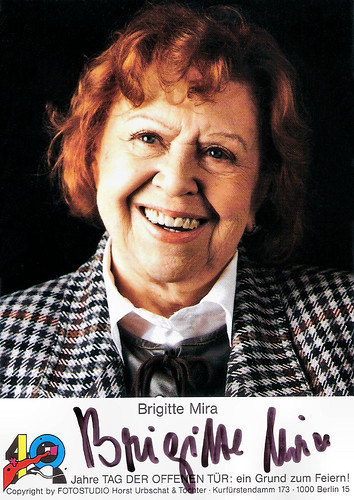
German promotion card. Photo: Fotostudio Horst Urbschat & Töchter, Berlin.
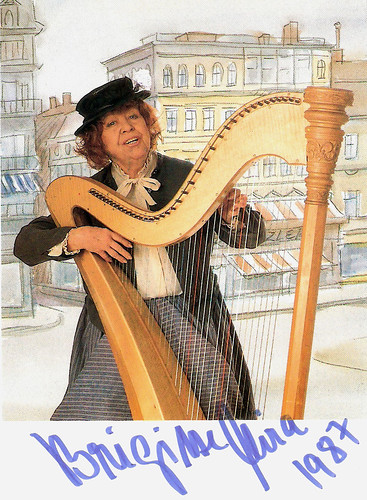
German autograph card by Funk Uhr. Caption: Funk Uhr presents Brigitte Mira as "Harfenjule". Harfenjule was the nickname of the legendary Berlin street musician Luise Nordmann, née Schulz (1829-1911), but is now also a general German term for street singers.
Brigitte Mira was born in 1910 in Hamburg, but she moved early on to Berlin. Her father was the Russian Jewish pianist Siegfried Mira, who had emigrated to Germany, and her mother was the German Elisabeth Strässner.
Brigitte began her stage career in Düsseldorf as a dancer under the name of Valencia Stramm. In the late 1920s, she debuted as a singer in the role of Esmeralda in Smetana's The Bartered Bride in Cologne. She also worked as a cabaret artist under the name of Gitta Mira.
During the Nazi era, Mira took part in the propaganda series Liese und Miese, short films that were produced to support the newsreels. She played Miese - the bad role model according to Nazi ideology—who listened to enemy radio stations and stockpiled rationed food. But her acting skills made her 'bad' character more popular than the good character, Liese, portrayed by Gisela Schlüter. After ten episodes, the series was cancelled by the Ministry of Propaganda for being counterproductive. The propaganda directors did not know that Mira was half-Jewish, for she had false papers. Even though she insisted on her naiveté as a young woman and the fact that she had to conceal her origins, she was criticised later by some for taking part in these ads at all.
After the war, Brigitte Mira made her film debut with a small part in the post-war satire Berliner Ballade / Berlin Ballad (Robert A. Stemmle, 1948) with Gert Fröbe. She played supporting parts in film operettas and lightweight comedies like the musical ...und abends in die Scala / An Evening at the Scala (Erik Ode, 1958) with Caterina Valente, and the musical comedy Der Stern von Santa Clara / The Star of Santa Clara (Werner Jacobs, 1958), starring Vico Torriani and Gerlinde Locker.
During the 1960s, Mira often played on television in shows and in TV films like the comedy Der Vetter aus Dingsda / The Cousin from Dingsda (Imo Moszkowicz, 1960) with Birgit Bergen, the musical Frau Luna / Lady Moon (Thomas Engel, 1964) featuring Margit Schramm, and a Dutch-German version of Der Vetter aus Dingsda / The Cousin from Dingsda (Willy van Hemert, 1970), now with Mieke Bos. She also incidentally played in films, like the crime drama Das Stundenhotel von St. Pauli / Hotel by the Hour (Rolf Olsen, 1970) with Curd Jürgens.
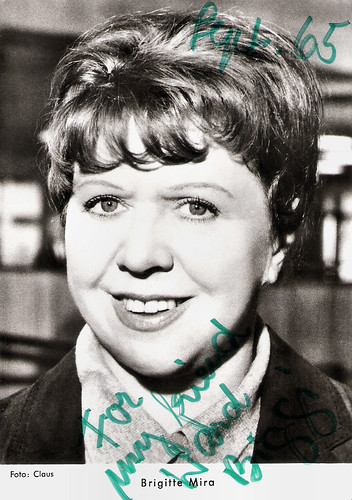
German postcard by Graphima, Berlin. Photo: Claus.
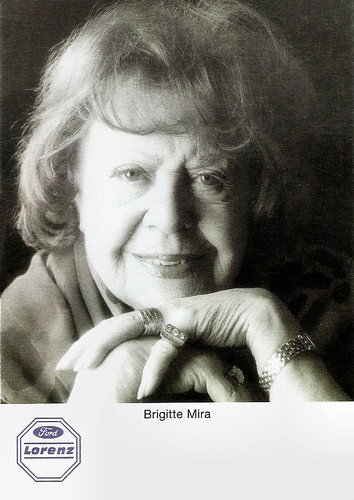
German promotion card by Ford Lorenz. Photo: Fotostudio Horst Urbschat & Töchter, Berlin.
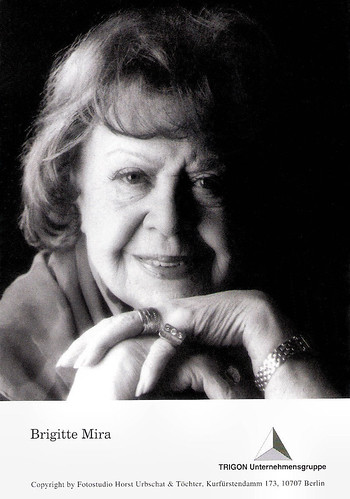
German promotion card by TRIGON Unternehmensgruppe. Photo: Fotostudio Horst Urbschat & Töchter, Berlin.
Brigitte Mira’s breakthrough followed in the 1970s when the West German cinema was rejuvenated with the Neue Deutsche Welle – the New German Wave. She had a supporting part in the horror film Die Zärtlichkeit der Wölfe / The Tenderness of Wolves (Ulli Lommel, 1973), based on the crimes of German serial killer and cannibal Fritz Haarmann. It was written by Kurt Raab, who also stars in the film, and produced by Rainer Werner Fassbinder. She also played a small part as the mother of Hanna Schygulla’s character in the TV mini-series Acht Stunden sind kein Tag / Eight hours are not a day (Rainer Werner Fassbinder, 1973).
Then Fassbinder made Brigitte Mira a star when he gave her the leading role of Emmi Kurowski in Angst essen Seele auf / Fear Eats the Soul (Rainer Werner Fassbinder, 1974). The film revolves around an unlikely relationship which develops between an elderly woman (Mira) and a Moroccan migrant worker (El Hedi ben Salem) in post-war Germany. The film won two awards at the 1974 Cannes Film Festival and is considered to be one of Fassbinder's most powerful works. Brigitte Mira received the German Film Award for her performance. She also worked with Werner Herzog on his film Jeder für sich und Gott gegen alle / The Enigma of Kaspar Hauser (Werner Herzog, 1974) starring Bruno Schleinstein as the foundling Kaspar Hauser. At the 1975 Cannes Film Festival, the film won the Grand Prix Spécial du Jury.
Mira starred in several more films by Rainer Werner Fassbinder, including Mutter Küsters' Fahrt zum Himmel / Mother Küsters' Trip to Heaven (Rainer Werner Fassbinder, 1975), Faustrecht der Freiheit / Fox and His Friends (Rainer Werner Fassbinder, 1975), starring Fassbinder himself, the TV film Angst vor der Angst / Fear of Fear (Rainer Werner Fassbinder, 1975), Satansbraten / Satan's Brew (Rainer Werner Fassbinder, 1976) with Kurt Raab, Chinesisches Roulette / Chinese Roulette (Rainer Werner Fassbinder, 1976) starring Margit Carstensen, and Fassbinder's magnum opus the TV series Berlin Alexanderplatz (Rainer Werner Fassbinder, 1980).
She also appeared in his box office hit Lili Marleen (Rainer Werner Fassbinder, 1980), featuring Hanna Schygulla. Another director with whom she worked several times was Wolf Gremm, e.g. on Kamikaze 1989 (Wolf Gremm, 1982). In the 1980s, Mira achieved another big success with the television series Drei Damen vom Grill / Three Ladies from the Snackbar (1976-1991). The series was about the Färber family (Margarete, Magda and Margot Färber) running a snackbar in West Berlin. Since the show not only depicts their work but was also received as a picture from the divided city of Berlin, Drei Damen vom Grill was discontinued shortly after the German Reunification.
Brigitte Mira also worked as a voice actor and dubbed the Widow Tweed in Disney's The Fox and the Hound (Ted Berman, Richard Rich, and Art Stevens, 1981). In 1991, she appeared in the Berlin stage production of Stephen Sondheim's Follies. During the late 1990s, Mira performed with Evelyn Künneke and Helen Vita in the self-deprecating song show 'Drei Alte Schachteln' (Three old hags). Towards the end of her career, Mira was regarded as a national treasure, and in 1995 she was awarded the Bundesverdienstkreuz, the highest German decoration. Brigitte Mira died in 2005 in Berlin. She was 94. She was married to Frank Guerente, Horst Fabian, Paul Cornelius, Reinhold Tabatt and actor Peter Schütte. In 2006, her final screen appearance in the TV film Aszendent Liebe / Ascendant love (Helmut Metzger, 2006) was posthumously shown.
Brigitte Mira singing Leonard Cohen's 'Bird on a Wire' in Wie ein Vogel auf dem Draht / Like a Bird on a Wire (Rainer Werner Fassbinder, 1975). Source: Bruno Colli (YouTube).
Sources: Wikipedia (German and English), and IMDb.
This post was last updated on 20 September 2025.

German promotion card. Photo: Fotostudio Horst Urbschat & Töchter, Berlin.

German autograph card by Funk Uhr. Caption: Funk Uhr presents Brigitte Mira as "Harfenjule". Harfenjule was the nickname of the legendary Berlin street musician Luise Nordmann, née Schulz (1829-1911), but is now also a general German term for street singers.
Bad role model
Brigitte Mira was born in 1910 in Hamburg, but she moved early on to Berlin. Her father was the Russian Jewish pianist Siegfried Mira, who had emigrated to Germany, and her mother was the German Elisabeth Strässner.
Brigitte began her stage career in Düsseldorf as a dancer under the name of Valencia Stramm. In the late 1920s, she debuted as a singer in the role of Esmeralda in Smetana's The Bartered Bride in Cologne. She also worked as a cabaret artist under the name of Gitta Mira.
During the Nazi era, Mira took part in the propaganda series Liese und Miese, short films that were produced to support the newsreels. She played Miese - the bad role model according to Nazi ideology—who listened to enemy radio stations and stockpiled rationed food. But her acting skills made her 'bad' character more popular than the good character, Liese, portrayed by Gisela Schlüter. After ten episodes, the series was cancelled by the Ministry of Propaganda for being counterproductive. The propaganda directors did not know that Mira was half-Jewish, for she had false papers. Even though she insisted on her naiveté as a young woman and the fact that she had to conceal her origins, she was criticised later by some for taking part in these ads at all.
After the war, Brigitte Mira made her film debut with a small part in the post-war satire Berliner Ballade / Berlin Ballad (Robert A. Stemmle, 1948) with Gert Fröbe. She played supporting parts in film operettas and lightweight comedies like the musical ...und abends in die Scala / An Evening at the Scala (Erik Ode, 1958) with Caterina Valente, and the musical comedy Der Stern von Santa Clara / The Star of Santa Clara (Werner Jacobs, 1958), starring Vico Torriani and Gerlinde Locker.
During the 1960s, Mira often played on television in shows and in TV films like the comedy Der Vetter aus Dingsda / The Cousin from Dingsda (Imo Moszkowicz, 1960) with Birgit Bergen, the musical Frau Luna / Lady Moon (Thomas Engel, 1964) featuring Margit Schramm, and a Dutch-German version of Der Vetter aus Dingsda / The Cousin from Dingsda (Willy van Hemert, 1970), now with Mieke Bos. She also incidentally played in films, like the crime drama Das Stundenhotel von St. Pauli / Hotel by the Hour (Rolf Olsen, 1970) with Curd Jürgens.

German postcard by Graphima, Berlin. Photo: Claus.

German promotion card by Ford Lorenz. Photo: Fotostudio Horst Urbschat & Töchter, Berlin.

German promotion card by TRIGON Unternehmensgruppe. Photo: Fotostudio Horst Urbschat & Töchter, Berlin.
Fassbinder and the New German Wave
Brigitte Mira’s breakthrough followed in the 1970s when the West German cinema was rejuvenated with the Neue Deutsche Welle – the New German Wave. She had a supporting part in the horror film Die Zärtlichkeit der Wölfe / The Tenderness of Wolves (Ulli Lommel, 1973), based on the crimes of German serial killer and cannibal Fritz Haarmann. It was written by Kurt Raab, who also stars in the film, and produced by Rainer Werner Fassbinder. She also played a small part as the mother of Hanna Schygulla’s character in the TV mini-series Acht Stunden sind kein Tag / Eight hours are not a day (Rainer Werner Fassbinder, 1973).
Then Fassbinder made Brigitte Mira a star when he gave her the leading role of Emmi Kurowski in Angst essen Seele auf / Fear Eats the Soul (Rainer Werner Fassbinder, 1974). The film revolves around an unlikely relationship which develops between an elderly woman (Mira) and a Moroccan migrant worker (El Hedi ben Salem) in post-war Germany. The film won two awards at the 1974 Cannes Film Festival and is considered to be one of Fassbinder's most powerful works. Brigitte Mira received the German Film Award for her performance. She also worked with Werner Herzog on his film Jeder für sich und Gott gegen alle / The Enigma of Kaspar Hauser (Werner Herzog, 1974) starring Bruno Schleinstein as the foundling Kaspar Hauser. At the 1975 Cannes Film Festival, the film won the Grand Prix Spécial du Jury.
Mira starred in several more films by Rainer Werner Fassbinder, including Mutter Küsters' Fahrt zum Himmel / Mother Küsters' Trip to Heaven (Rainer Werner Fassbinder, 1975), Faustrecht der Freiheit / Fox and His Friends (Rainer Werner Fassbinder, 1975), starring Fassbinder himself, the TV film Angst vor der Angst / Fear of Fear (Rainer Werner Fassbinder, 1975), Satansbraten / Satan's Brew (Rainer Werner Fassbinder, 1976) with Kurt Raab, Chinesisches Roulette / Chinese Roulette (Rainer Werner Fassbinder, 1976) starring Margit Carstensen, and Fassbinder's magnum opus the TV series Berlin Alexanderplatz (Rainer Werner Fassbinder, 1980).
She also appeared in his box office hit Lili Marleen (Rainer Werner Fassbinder, 1980), featuring Hanna Schygulla. Another director with whom she worked several times was Wolf Gremm, e.g. on Kamikaze 1989 (Wolf Gremm, 1982). In the 1980s, Mira achieved another big success with the television series Drei Damen vom Grill / Three Ladies from the Snackbar (1976-1991). The series was about the Färber family (Margarete, Magda and Margot Färber) running a snackbar in West Berlin. Since the show not only depicts their work but was also received as a picture from the divided city of Berlin, Drei Damen vom Grill was discontinued shortly after the German Reunification.
Brigitte Mira also worked as a voice actor and dubbed the Widow Tweed in Disney's The Fox and the Hound (Ted Berman, Richard Rich, and Art Stevens, 1981). In 1991, she appeared in the Berlin stage production of Stephen Sondheim's Follies. During the late 1990s, Mira performed with Evelyn Künneke and Helen Vita in the self-deprecating song show 'Drei Alte Schachteln' (Three old hags). Towards the end of her career, Mira was regarded as a national treasure, and in 1995 she was awarded the Bundesverdienstkreuz, the highest German decoration. Brigitte Mira died in 2005 in Berlin. She was 94. She was married to Frank Guerente, Horst Fabian, Paul Cornelius, Reinhold Tabatt and actor Peter Schütte. In 2006, her final screen appearance in the TV film Aszendent Liebe / Ascendant love (Helmut Metzger, 2006) was posthumously shown.
Brigitte Mira singing Leonard Cohen's 'Bird on a Wire' in Wie ein Vogel auf dem Draht / Like a Bird on a Wire (Rainer Werner Fassbinder, 1975). Source: Bruno Colli (YouTube).
Sources: Wikipedia (German and English), and IMDb.
This post was last updated on 20 September 2025.
No comments:
Post a Comment